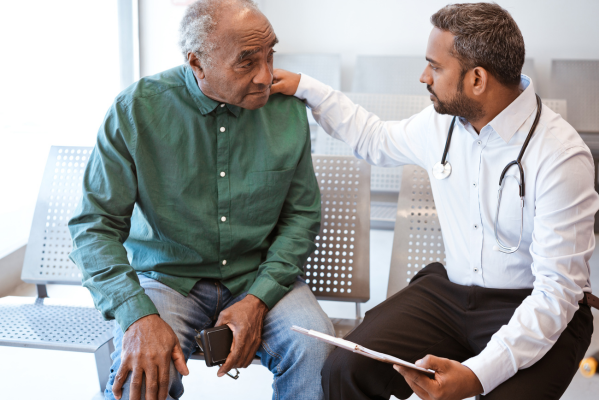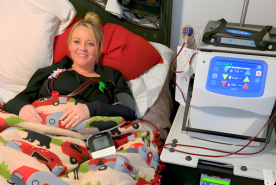April 25, 2023
Choosing to participate in a clinical trial is a big decision that may change the course of your life. Before making that choice, it’s important to understand how clinical trials work and the possible benefits and risks involved. Read on to get all the answers you need to make an informed decision.
Who can participate?
Each study has rules about who can or cannot participate, called "eligibility." These rules or criteria are typically stated clearly on the clinical trial site. In some cases, you may need to have certain tests done to see if you are eligible, in which case, It can take up to a month to hear if you are eligible or not.
Your eligibility may be based on the following:
- age
- gender
- overall health
- type and stage of a disease
- treatment history
[VIDEO::http://www.youtube.com/watch?v=0a-BVYVZqmQ::aVideoStyle]
"A doctor presented two study options to me with my condition and medical history in mind. We both knew I was a strong candidate for these trials. After choosing one, I had a biopsy to make sure my kidney function was up-to-date," said Laura, a kidney disease patient. "I was also interviewed for my mental health with a questionnaire."
Before participating, researchers will ask if you understand the trial and the possible risks and benefits. Once you have a handle on the ins and outs of the trial, you'll sign an "informed consent" document.
"The process of informed consent was really good. The transplant doctor discussed the trial with me prior to seeing the consent form," said Mary, an end-stage kidney disease patient. "When the research nurse went over the clinical trial, she went through the consent form page by page and encouraged me to ask questions."
Learn more about the qualifications needed to join a clinical trial.
Are clinical trials safe?
[VIDEO::http://www.youtube.com/watch?v=ST_geHIfHI4::aVideoStyle]
Clinical studies are regulated by the Food and Drug Administration (FDA) and monitored by independent panels to protect your safety. They also ensure that the benefits of the clinical trial outweigh the possible risk for most people.
"During the clinical trial, my nurse asked me questions about my health and explained possible side effects from taking the medication," said Tanya, a kidney disease patient. "She frequently asked if I was comfortable in the trial and if I was comfortable continuing it."
There are various phases of clinical trials with different goals in each stage. If a new medication or treatment is successful in one step, testing will continue in the trial's next phase until it is approved for use by the FDA to the public Even after a new drug or treatment is approved, testing continues to learn more about how it affects people with other diseases, or how it affects people in the long-term.
Clinical trial phases:
- Phase I: This stage focuses on finding the best dosage with the fewest side effects using a small group of people.
- Phase II: The next stage adds more people to the trial to determine if the treatment works and whether or not it is tolerable to most people.
- Phase III: The third stage is conducted with a large population and compares the new treatment to currently available ones to determine if it is more effective or has fewer side effects.
- Phase IV: Once the FDA has approved the treatment for public use, these trials determine how the medicine affects special populations, for example, those with kidney disease.
Keep reading about clinical trial safety.
How long do clinical trials last?
[VIDEO::http://www.youtube.com/watch?v=KRafWbHpVo8::aVideoStyle]
Researchers will explain the timeframe, as it varies per study. Some last for a short time, while others continue for years or indefinitely.
"I responded so well to the clinical trial. My biopsy results revealed less chronicity, less inflammation, and less protein leakage," said Laura."
Learn more about clinical trials.
Find a clinical trial near you
[VIDEO::http://www.youtube.com/watch?v=2Pylnu7cMGI::aVideoStyle]
Participating in a clinical trial could help you and future patients with kidney disease.
“I would recommend others to join in helping with research and joining a clinical trial. I think the opportunity that we can make and change history is really important. We need to have clinical trials to find new devices and medications. I really recommend participating and hope that in the future that people do consider doing clinical trials,” said Mary. “I know that people often feel that they don’t want to participate in a clinical trial because it’s experimental but that is how we learn. As long as you read the consent form and understand the benefits and risks, it’s really your decision to make. I hope people in the future aren’t frightened by doing clinical trials and that we have more people so we can get new, fabulous and wonderful treatments out there.”
Find a clinical trial near you.
Questions about clinical trials?
The NKF Cares Help Line is here to help. Get answers from a trained professional by emailing nkfcares@kidney.org or calling 855.NKF.CARES (855.653.2273).









